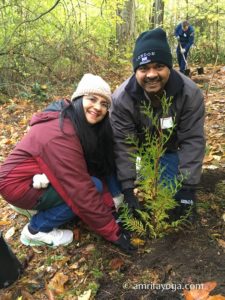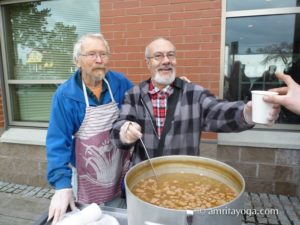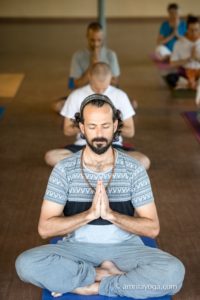 “Sure,” you may think, “Compassion is nice, but what does it have to do with yoga?”
“Sure,” you may think, “Compassion is nice, but what does it have to do with yoga?”
Amrita Yoga strives to stay true to the essence of yoga. And the goal of yoga is not just a healthy body, but liberation or enlightenment – oneness with all that is.
Acting in compassionate ways helps us to feel more connected to other people and beings. We move closer to that sense of Oneness. It also adds to our personal sense of well-being.
Amrita Yoga is inspired and guided by Sri Mata Amritanandamayi, known as Amma (which means Mother). For her, helping others has been a way of life since she was a small child.
 In those early days, Amma would clean the homes of people who were sick, and sometimes gave away her family’s own food, or even their valuables, to help people who had no food or medicine.
In those early days, Amma would clean the homes of people who were sick, and sometimes gave away her family’s own food, or even their valuables, to help people who had no food or medicine.
For the past 30 years Amma has spent many hours almost every day, embracing thousands of people. She has also started many humanitarian programs, both large and small. She continues to help others in many ways.
(For more information about Amma’s many initiatives, such as: offering pensions to widows, opening schools and hospitals, and building thousands of homes for people left homeless by earthquakes or the tsunami, as well as much more, please see: www.embracingtheworld.org)
Amma never stops. As long as people are suffering, she keeps offering her love and compassion, and creating new programs to help them. Her deeply caring example has also inspired people all over the world to begin even more humanitarian projects.
Many come for Amma’s blessing and embrace. Many also share with her their problems, pain and grief. Even Amma’s smallest actions, such as sharing a gentle smile, or lovingly wiping someone’s tears, can move people deeply and create lasting change.
 What Can We Do?
What Can We Do?
We may think, “What difference can I make? What can one person do that will matter? I don’t have time, I have a busy life, so much to do …”
We all have the power to help others. And we can help in more ways than we can imagine. We just need to start somewhere.
Do you recall a time when a friend, or even a stranger, did something kind for you? And seemed to expect nothing in return? Perhaps a friend brought soup when you were sick, a stranger let you go ahead in the grocery line, or you received an unexpected smile that lifted your spirits.
No doubt you can also recall a time when you were the one to offer help. Maybe you took the time to call a depressed friend, or brought cookies for your workmates, or made a loved one’s favorite meal?
Sometimes the idea of being selfless doesn’t appeal to us. Maybe we feel we’re not happy enough yet — that we need to be happier, or have more, before we can spend time or energy focusing on others.
 Well, guess what? If we want to transform our lives, Amma tells us, all we need to do is to take less, give more, and help others.
Well, guess what? If we want to transform our lives, Amma tells us, all we need to do is to take less, give more, and help others.
Maybe you think that sounds too simple. But in fact, researchers in the field of positive psychology have found helping others is one of our most rewarding activities. Apparently it is more rewarding than getting all those things we think we want!
Research shows that those who pursue meaningful activities, such as helping others, find greater life satisfaction than those who mainly pursue pleasure, says Martin Seligman, founder of positive psychology.
The people (and even children) who make a habit of giving their time and care report being happier and having higher self-esteem, among other things, than those who don’t.
In one of her New Year’s messages, Amma suggested that we “never squander an opportunity to help others.” Her choice of words suggests that opportunities to help are valuable – to us. And she says it is through our acts of kindness and generosity that we earn God’s grace.
 God’s grace can appear to be good fortune, or ‘just luck’, but Amma says in fact it has been earned by past good actions, whether in this life or another. Amma says it will always benefit us to help others, though we may not see results right away.
God’s grace can appear to be good fortune, or ‘just luck’, but Amma says in fact it has been earned by past good actions, whether in this life or another. Amma says it will always benefit us to help others, though we may not see results right away.
We know most major religions agree that helping others benefits us spiritually, whether they believe in karma and past lives or not.
Amma sets an example for us. Although she travels about nine months of the year, in order to bless and bring love to people all over the world, she refuses to spend money needlessly on extra comforts or luxuries. Not when that money could be used to ease someone else’s suffering.
Below Amma describes a normal day for her.
“In India, at least 20 percent of the thousands of people who come to see me each day are teetering on the edge of destitution and suicide. Seeing the sadness on the face of a woman who recently came to see me, I asked her what was wrong,” Amma says.
“She said she suffered from chronic kidney failure. After her diagnosis, her husband had left her, leaving her with their two children. Without any education or job, she had to borrow money from loan sharks, who were now harassing her.
“She said, ‘Amma, to survive, I’m supposed to undergo 10 weekly dialysis sessions. I can’t even dream of that kind of money. So, I have no choice but to skip some.’
 “My eyes filled with tears,” Amma continues. “I told her not to worry — that our hospital would take care of her medical needs, and that the ashram would help educate her children. Hearing this, she burst into tears. She then confessed that she had been so hopeless that she had planned to poison her children and commit suicide. ‘I’d even written the suicide note.’
“My eyes filled with tears,” Amma continues. “I told her not to worry — that our hospital would take care of her medical needs, and that the ashram would help educate her children. Hearing this, she burst into tears. She then confessed that she had been so hopeless that she had planned to poison her children and commit suicide. ‘I’d even written the suicide note.’
“What would have happened if I had not enquired about her life?” Amma asks. “There are thousands of such families. To see and help them, we just need eyes and a heart that feels.
“Once a woman who had the habit of buying lavish things spent a month in our ashram. Later, she wrote me a letter. She said, after returning home, she had become obsessed with owning a particular expensive designer watch.
“To save the money, she had to work overtime. When she had saved enough, she went to the jeweler. However, in the shop, she suddenly remembered our ashram’s orphanage.
“She thought, ‘While buying this watch may make me happy for some time, I could use the money to help people who lack basic necessities instead. Even a $10 watch is enough to know the time.’
 “Finally she decided to buy a cheap watch and use the money to help the poor instead. She concluded by writing, ‘Thank you for helping me reconnect with the love within me.’
“Finally she decided to buy a cheap watch and use the money to help the poor instead. She concluded by writing, ‘Thank you for helping me reconnect with the love within me.’
“Such expansive attitudes will dawn if we imbibe spirituality. If our left hand is injured, the right hand will spontaneously caress it. Why? Because they are one.
“Similarly, appreciating that we are all of one essence should prompt us to act accordingly, serving the poor and needy.
“This understanding and effort is what is meant by ‘making space in our hearts for others.’ If we can do this, little by little we can come to experience the love that is our True Self.
“Remember, we all have something to give. A smile doesn’t cost one cent, yet all too often we forget to give even this to others.
“We have nothing to lose by looking at people with love and affection. Even our seemingly most insignificant acts can help others.”
Some suggestions for increasing your compassionate actions:
Make a conscious effort to attune yourself with your heart, rather than relying only on your mind. This helps connect us with our innate love and compassion, and to be present in this moment, the only one that matters.
- One day each week, make a vow to be helpful to others. See how many ways you can find to be helpful on that day.
- Stanford psychology professor Sonja Lyubomirsky suggests doing five acts of kindness, one day each week. The acts of kindness can be large or small. They don’t have to be the same each week, or for the same person. And the person may or may not know you have done it, either way is fine. Her research has found this will reliably make you happier, and can also lift the spirits of those around you, whether or not they are the ones you’re doing kind things for.
- An internet search for ‘random acts of kindness’ will help you find a long list of helpful acts to consider.
- Make a commitment to volunteer some time each week helping those less fortunate, e.g. visiting a hospital, serving food to the poor, working in a food bank, writing a prison inmate, helping a community garden, knitting for the homeless, etc.
- When we see someone suffering, lean in and listen – to them, but also to your own inner voice, your conscience. Listen for what is possible for you. Maybe you don’t need to do anything heroic or expensive, maybe you just need to meet their eyes and acknowledge the other person’s presence and their pain.
- Plant trees. This benefits all of us, and Mother Nature too. Amma says tree planting is a great seva (selfless service) in itself. It gives fruit, flowers and shade to many people for years, and purifies the atmosphere as well.
What is Needed: The Bridge of Compassion
“There will always be rich and poor,” Amma says. “However, currently the gap between the haves and have-nots transcends all bounds. It is like a mountain on one side and an abyss on the other. Unless we reduce this gap, it could result in unrest, even violence. We need to build a bridge of compassion.
“We need to cultivate an outlook that appreciates the essential oneness of all beings.
“Although we may see one thousand suns reflected in one thousand pots of water, there is only one sun. When we see the consciousness within all of us as one, we will develop an outlook that considers the needs of others before our own desires for luxury.”
Building the Bridge
Cultivating this attitude of considering others, before satisfying our own desires for extras, might be a good place to start making small changes in our lives.
As this attitude begins to grow within us, so does the joy of giving and serving. Amma gives an example: think about taking only what is necessary, rather than what might be nice to have, a luxury, or unnecessary.
Something to consider: Amma has said many Westerners believe it is people from well-off Western countries who give most of the money to Amma’s charities.
Actually, she says, it is people in India who give the most, including people who can only save money by missing some meals in order to help those less fortunate. There are so many of these generous souls that the sum total of their donations is very large. What inspiring generosity!
With the money and energy we can save by learning to take less for ourselves, we can think about ways we can ease the lives of others. At the same time, we will increase the priceless qualities of joy, peace and satisfaction in our own hearts.
Try it! You could begin now, making space for others with a smile, donating your morning coffee money – the possibilities are endless!
We would love to hear about your experiments with increasing your compassion!
Author: Brahmacharini Shobana
(As always, thoughtful comments are invited and appreciated. Share your reflections with us! See below to leave a comment.)

0 Comments